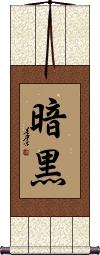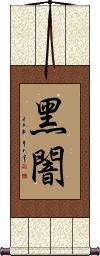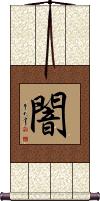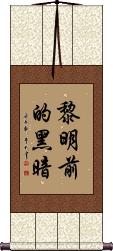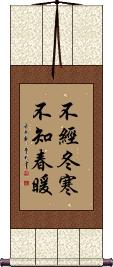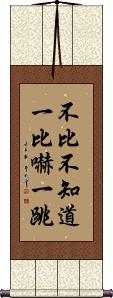Many custom options...
And formats...

Darkness in Chinese / Japanese...
Buy a Darkness calligraphy wall scroll here!
Personalize your custom “Darkness” project by clicking the button next to your favorite “Darkness” title below...
Darkness
Darkness
黑闇 is the two-character Chinese word for darkness.
The first character alone means black or dark.
The second character has several possible meanings, depending on context; They include: to shut the door, unilluminated, dark, gloomy, hidden, or secret.
Together, these two characters will, in most cases, be translated as dark or darkness.
Darkness
闇 is the shortest and universal way (in Chinese, Japanese Kanji, and old Korean Hanja) to write “darkness.”
In Chinese, this can mean dark, gloomy, hidden, secret, to shut the door, or unilluminated.
In Japanese, this can mean darkness, the dark, black-marketeering, dark, shady, or illegal.
In old Korean Hanja, this can mean dark, obscure, hidden, or secret.
![]() Note that there is an alternate form of this character. It is used as an alternate in all three languages (that rarely happens). You can see this alternate version to the right. If you want to order that version, please click on that character, instead of the button above.
Note that there is an alternate form of this character. It is used as an alternate in all three languages (that rarely happens). You can see this alternate version to the right. If you want to order that version, please click on that character, instead of the button above.
The Night is Darkest Before the Dawn
黎明前的黑暗 is the most natural way to write “The night is darkest before the dawn,” in Chinese.
The words break down this way by meaning this way:
1.黎明 dawn or daybreak
2.前 before, in front, ago, former, previous, and/or earlier
3.的 (possessive particle) of
4.黑暗 dark, darkly, or darkness
If you try to understand the Chinese word order and grammar, it's like, “Before dawn is the darkest [time].”
You must endure a harsh winter to appreciate the warmth of springtime
You must know hardship to appreciate happiness
This literally translates as: Without having experienced the cold of winter, one cannot appreciate the warmth of spring.
Figuratively, this means: One cannot truly appreciate happiness without having gone through hardship.
There are many contrasts in life. One simply cannot fully know what joy is without having experienced misery, difficulty, and pain. How could you explain “light” if you did not have “darkness” to compare it to?
Embrace hardship, as it makes the good times seem even better.
Comparison Leads to Truth and Enlightenment
不比不知道一比吓一跳 is a Chinese proverb that literally means: [If one not does] not make comparisons, [one will] not know [the truth] when [one] compares, [one will be] greatly surprised.
This goes to the idea that if you do not know bad times, you cannot know what good times are.
...And...
You can not know light without experiencing darkness.
Another way to translate this would be: If you wish to be enlightened, you need to make comparisons and analyze every aspect (of a situation, issue, or problem).
Not the results for Darkness that you were looking for?
Below are some entries from our dictionary that may match your Darkness search...
| Characters If shown, 2nd row is Simp. Chinese |
Pronunciation Romanization |
Simple Dictionary Definition |
暗 see styles |
àn an4 an an あん |
More info & calligraphy: Darkness(ant: 明・めい・1) darkness; (female given name) Hikage Dark, dim, gloom, dull; secret, hidden. |
闇 暗 see styles |
àn an4 an yami やみ |
More info & calligraphy: Darkness(noun - becomes adjective with の) (1) darkness; the dark; (2) bewilderment; despair; hopelessness; (3) hidden place; secrecy; oblivion; (noun - becomes adjective with の) (4) black market; shady trading; underhand transactions; illegal channels; (personal name) Awa To shut; dark; retired; translit. am, cf. 暗, 菴. |
地獄 地狱 see styles |
dì yù di4 yu4 ti yü jigoku じごく |
More info & calligraphy: Hell(1) {Buddh} hell realm; Naraka; (2) {Christn} Hell; (3) hell; misery; nightmare; inferno; (4) place where a volcano or hot springs constantly spew smoke or steam; (place-name) Jigoku naraka, 捺落迦 (or 那落迦) ; niraya 泥犂; explained by 不樂 joyless; 可厭 disgusting, hateful; 苦具, 苦器 means of suffering; if 地獄 earth-prison; 冥府 the shades, or departments of darkness. Earth-prison is generally intp. as hell or the hells; it may also be termed purgatory; one of the six gati or ways of transmigration. The hells are divided into three classes: I. Central, or radical, 根本地獄 consisting of (1) The eight hot hells. These were the original hells of primitive Buddhism, and are supposed to be located umder the southern continent Jambudvīpa 瞻部州, 500 yojanas below the surface. (a) 等活 or 更活 Saṃjīva, rebirth, where after many kinds of suffering a cold wind blows over the soul and returns it to this life as it was before, hence the name 等活. (b) 黑繩 Kaslasūtra, where the sufferer is bound with black chains and chopped or sawn asunder. (c) 線合; 衆合; 堆壓 Saṃghāta, where are multitudes of implements of torture, or the falling of mountains upon the sufferer. (d) 號呌; 呼呼; 叫喚 Raurava, hell of wailing. (e) 大呌; 大號呌; 大呼 Mahāraurava, hell of great wailing. (f) 炎熱; 燒炙 Tapana, hell of fames and burning. (g) 大熱; 大燒炙; 大炎熱 Pratāpana, hell of molten lead. (h) 無間; 河鼻旨; 阿惟越致; 阿毗至; 阿鼻; 阿毗 Avīci, unintermitted suffering, where sinners die and are reborn to suffer without interval. (2) The eight cold hells 八寒地獄. (a) 頞浮陀地獄 Arbuda, where the cold causes blisters. (b) 尼刺部陀 Nirarbuda, colder still causing the blisters to burst. (c) 頞哳吒; 阿吒吒 Atata, where this is the only possible sound from frozen lips. (d) 臛臛婆; 阿波波 Hahava or Apapa, where it is so cold that only this sound can be uttered. (e) 虎虎婆 Hāhādhara or Huhuva, where only this sound can be uttered. (f) 嗢鉢羅; 鬱鉢羅 (or 優鉢羅) Utpala, or 尼羅鳥 (or 漚) 鉢羅 Nīlotpala, where the skin is frozen like blue lotus buds. (g) 鉢特摩 Padma, where the skin is frozen and bursts open like red lotus buds. (h) 摩訶鉢特摩 Mahāpadma, ditto like great red lotus buds. Somewhat different names are also given. Cf. 倶舍論 8; 智度論 16; 涅槃經 11. II. The secondary hells are called 近邊地獄 adjacent hells or 十六遊增 each of its four sides, opening from each such door are four adjacent hells, in all sixteen; thus with the original eight there are 136. A list of eighteen hells is given in the 十八泥梨經. III. A third class is called the 孤地獄 (獨地獄) Lokāntarika, or isolated hells in mountains, deserts, below the earth and above it. Eitel says in regard to the eight hot hells that they range 'one beneath the other in tiers which begin at a depth of 11,900 yojanas and reach to a depth of 40,000 yojanas'. The cold hells are under 'the two Tchahavālas and range shaft-like one below the other, but so that this shaft is gradually widening to the fourth hell and then narrowing itself again so that the first and last hell have the shortest, those in the centre the longest diameter'. 'Every universe has the same number of hells, ' but 'the northern continent has no hell whatever, the two continents east and west of Meru have only small Lokāntarika hells... whilst all the other hells are required for the inhabitants of the southern continent '. It may be noted that the purpose of these hells is definitely punitive, as well as purgatorial. Yama is the judge and ruler, assisted by eighteen officers and a host of demons, who order or administer the various degrees of torture. 'His sister performs the same duties with regard to female criminals, ' and it may be mentioned that the Chinese have added the 血盆池 Lake of the bloody bath, or 'placenta tank' for women who die in childbirth. Release from the hells is in the power of the monks by tantric means. |
暗黒 see styles |
ankoku あんこく |
More info & calligraphy: Darkness |
黑暗 see styles |
hēi àn hei1 an4 hei an |
dark; darkly; darkness |
黎明前的黑暗 see styles |
lí míng qián de hēi àn li2 ming2 qian2 de5 hei1 an4 li ming ch`ien te hei an li ming chien te hei an |
More info & calligraphy: The Night is Darkest Before the Dawn |
冥 see styles |
míng ming2 ming mei / me めい |
dark; deep; stupid; the underworld (female given name) Mei Darkness, obscurity; deep. Hades; used chiefly in the sense of 無知 ignorance, profound, secret, invisible, e.g. as opposed to 顯 open, manifest. |
昏 see styles |
hūn hun1 hun kon |
muddle-headed; twilight; to faint; to lose consciousness Dusk, dull, confused. |
佛日 see styles |
fó rì fo2 ri4 fo jih butsunichi |
The Buddha-sun which drives away the darkness of ignorance; the day of Buddha. |
六気 see styles |
rokki; rikki; rikuki ろっき; りっき; りくき |
(1) yin, yang, wind, rain, darkness, light; (2) cold, heat, dryness, dampness, wind, fire; (3) six emotions (joy, anger, sorrow, pleasure, love, hate) |
冥一 see styles |
míng yī ming2 yi1 ming i myōichi |
Entire obscurity, pristine darkness. |
冥使 see styles |
míng shǐ ming2 shi3 ming shih myōshi |
Lictors, or messengers of Hades. |
冥冥 see styles |
míng míng ming2 ming2 ming ming myōmyō めいめい |
(adj-t,adv-to,adj-no,n) dark; invisible darkness |
冥初 see styles |
míng chū ming2 chu1 ming ch`u ming chu myōsho |
The primitive darkness (at the beginning of existence). |
冥府 see styles |
míng fǔ ming2 fu3 ming fu meifu / mefu めいふ |
underworld; hell (1) (See 冥土) realm of the dead; the other world; underworld; (2) hell The palace of darkness, Hades. |
冥庭 see styles |
míng tíng ming2 ting2 ming t`ing ming ting myōtei |
courts of darkness |
冥往 see styles |
míng wǎng ming2 wang3 ming wang myōō |
Going into the shades, death. |
冥道 see styles |
míng dào ming2 dao4 ming tao meidō |
path to the underworld (in Daoist or folk beliefs, referring to the journey of spirits after death) 冥途; 冥土 The dark way, or land of darkness, the shades, Hades, pretas, etc. |
刁斗 see styles |
diāo dǒu diao1 dou3 tiao tou |
soldier's copper saucepan, used for cooking food by day and for sounding the night watches during the hours of darkness (in ancient times) |
四蛇 see styles |
sì shé si4 she2 ssu she shida |
idem 四毒蛇. The Fanyimingyi under this heading gives the parable of a man who fled from the two bewildering forms of life and death, and climbed down a rope (of life) 命根, into the well of impermanence 無常, where two mice, night and day, gnawed the rattan rope; on the four sides four snakes 四蛇 sought to poison him, i. e. the 四大 or four elements of his physical nature); below were three dragons 三毒龍 breathing fire and trying to seize him. On looking up he saw that two 象 elephants (darkness and light) had come to the mouth of the well; he was in despair, when a bee flew by and dropped some honey (the five desires 五欲) into his mouth, which he ate and entirely forgot his peril. |
夜幕 see styles |
yè mù ye4 mu4 yeh mu |
curtain of night; gathering darkness |
夜闇 see styles |
yè àn ye4 an4 yeh an yaan よやみ |
dead of night; shades of night; black of night nighttime darkness |
天瞽 see styles |
tiān gǔ tian1 gu3 t`ien ku tien ku tenko |
heavenly darkness |
常闇 see styles |
tokoyami とこやみ |
everlasting darkness |
幽冥 see styles |
yōu míng you1 ming2 yu ming yū mei ゆうめい |
dark; hell; netherworld; hades semidarkness; deep and strange; hades; the present and the other world; dark and light darkness |
幽明 see styles |
yōu míng you1 ming2 yu ming yuumei / yume ゆうめい |
the hidden and the visible; that which can be seen and that which cannot; darkness and light; night and day; wisdom and ignorance; evil and good; the living and the dead; men and ghosts semidarkness; deep and strange; hades; the present and the other world; dark and light; (given name) Yūmei darkness and light |
幽暗 see styles |
yōu àn you1 an4 yu an yuuan / yuan ゆうあん |
gloom (noun or adjectival noun) gloom; darkness; seclusion |
幽闇 see styles |
yuuan / yuan ゆうあん |
(noun or adjectival noun) gloom; darkness; seclusion |
微闇 see styles |
wēi àn wei1 an4 wei an mian |
faint darkness |
明冥 see styles |
míng míng ming2 ming2 ming ming myōmyō |
The (powers of) light and darkness, the devas and Yama, gods and demons, also the visible and invisible. |
Click here for more Darkness results from our dictionary
The following table may be helpful for those studying Chinese or Japanese...
| Title | Characters | Romaji (Romanized Japanese) | Various forms of Romanized Chinese | |
| Darkness | 暗黒 | an koku / ankoku | ||
| Darkness | 黑闇 黑暗 | hēi àn / hei1 an4 / hei an / heian | ||
| Darkness | 闇 暗 | yami | àn / an4 / an | |
| The Night is Darkest Before the Dawn | 黎明前的黑暗 | lí míng qián de hēi àn li2 ming2 qian2 de hei1 an4 li ming qian de hei an limingqiandeheian | li ming ch`ien te hei an limingchienteheian li ming chien te hei an |
|
| You must endure a harsh winter to appreciate the warmth of springtime | 不經冬寒不知春暖 不经冬寒不知春暖 | bù jīng dōng hán bù zhī chūn nuǎn bu4 jing1 dong1 han2 bu4 zhi1 chun1 nuan3 bu jing dong han bu zhi chun nuan | pu ching tung han pu chih ch`un nuan pu ching tung han pu chih chun nuan |
|
| Comparison Leads to Truth and Enlightenment | 不比不知道一比嚇一跳 不比不知道一比吓一跳 | bù bǐ bù zhī dào yī bǐ xià yì tiào bu4 bi3 bu4 zhi1 dao4 yi1 bi3 xia4 yi4 tiao4 bu bi bu zhi dao yi bi xia yi tiao | pu pi pu chih tao i pi hsia i t`iao pu pi pu chih tao i pi hsia i tiao |
|
| In some entries above you will see that characters have different versions above and below a line. In these cases, the characters above the line are Traditional Chinese, while the ones below are Simplified Chinese. | ||||
Successful Chinese Character and Japanese Kanji calligraphy searches within the last few hours...
